- Home
- Harlan Ellison
Slippage Page 2
Slippage Read online
Page 2
Little more than a month ago, April 10th, Susan and I were scheduled to go to the wrap-party for the cast and crew of the television series on which I serve as Conceptual Consultant, Babylon 5. My friend Joe Straczynski, creator and producer of B5, with Kathryn Drennan, and Susan and I were going to meet up early in the evening and go enjoy ourselves at the party that would celebrate the wrap-up of our third season on the air.
The pains started early in the morning. I got up, as usual, about five a.m. and started the day's routine. The first pains pressed me flat as I climbed the stairs to the upstairs atrium office (now, $200,000 later, reconstructed from the earthquake, leaving us dead broke). I sat down on the stairs, and breathed deeply. It was as if a large chunk of dry pumpernickel crust had lodged in the wrong channel in my chest. I managed to get to the sofa in my office, and I lay down for about an hour with my feet elevated. The pain did subside a little. I'm immortal. I shook it off and went to work. There was an essay about artist Barclay Shaw that needed to be written for Carl Gnam's publication Realms of Fantasy. There was the rewrite on "From a Great Height" for Bruce David at Rage. There was a freebie about A.E. van Vogt that was needed for the awarding of his upcoming Grand Master trophy. There was the introduction to SLIPPAGE that Mark Ziesing and Houghton Mifflin were both waiting for...the book had been delayed and everyone was getting surly with me. That 6g garrotte of the demanding readership.
I started writing.
An hour later, now almost seven a.m., I slouched downstairs and hit the bed. It'll get better, I told myself. I also told Susan. It'll get better.
Never made the B5 party. Had to cancel out.
Thursday the 11th. More pain. Luncheon meeting here at the house with Stefan Rudnicki and Lee Montgomery and Mary Aarons of Dove Audio/Dove Publishing. The lunch was pizza. I had three pieces. I was back in bed shortly thereafter. It'll pass, it'll get better, I said to Susan. We were scheduled to go to dinner that night with Don Shain and Joe and Kathryn at the exclusive Cafe Bizou. The band of pressure now reached from armpit to armpit, and I felt it in my back.
Susan kept saying, "You need to go to the hospital!" and I snarled back at her, leave me alone, I've got to get through this, I've got to get SLIPPAGE out of here, Mark's desperate for it, and Houghton Mifflin has sent a lawyer's letter. I'll go see John Romm (my internist for more than thirty years) as soon as I get the damned book out of here.
We never got to Cafe Bizou.
Friday, April 12th, I was still on my back. Every time I got up to travel through the house to the office wing, to climb the stairs, to write what I'm writing now, the pain would smack me and I'd stumble, shuffle, weave my way back to the bedroom. Finally, at 4:30 in the afternoon, I said to Susan, "You'd better call John Romm. I think I'm in trouble."
Immortal. But not very bright. Slow to learn. Too damned stubborn and obstinate and locked into the habit patterns of a lifetime, too overwhelmed by the bogus urgency of deadlines, to understand that there are deadlines and there are deadlines. Fault lines. Fissures. The fault in my lines is the same as the fault in our stars. We live in the slide zone. Slippage.
"A tiling is not necessarily true
because a man dies for it."
Oscar Wilde
John didn't even bother with the usual admittance procedure at Cedars-Sinai Medical Center. He called ahead, as Susan and my assistant loaded me into the car, and in fifteen minutes I was being wheeled into the ER. How much damage I had done to the actual heart muscle by enduring three days of an ongoing heart attack, neither Susan nor I knew.
That was Friday. By the end of day—I had spent five and a half hours in the ER—only a curtain separating me from the unfortunate junkie whose hands were still cuffed from her arrest, as she whimpered and begged for attention—before they could free up a room in the Cardiac Intensive Care Unit.
They got me on blood thinners and beta blockers, and it was a convivial group of RNs who looked after me; and Susan, who stayed with me till quite late before she took a cab home. Susan doesn't drive.
Now, here's the interesting part.
I felt well enough the next day, Saturday, to ask Susan to bring in my typewriter and the folders of work that needed doing. My cardiovascular physician was out of town, and they had decided to keep me comfortable and stable in the CICU until Monday, when they'd go in for another angiogram. I still thought I was immortal.
So Susan brought in the portable Olympia, and three or four folders of projects that were in work and, trailing my IV, I managed to get out of bed with my ventilated-rear hospital gown gaping, and we propped up pillows on a chair, and I lowered the retractable table to its lowest point, and I sat there and typed out an essay titled "Trimalchio in West Egg" (which had been F. Scott Fitzgerald's original, discarded title for THE GREAT GATSBY) in about two hours. I'd finally licked at least one of the fault line deadlines in my rapidly disintegrating life. But see (I told the universe that wasn't even paying any attention), see, I'm fuckin' immortal; not even the hospital can stop me!
I asked Susan to fax off the piece to both Barclay Shaw and Shawna McCarthy, the editor of Realms of Fantasy, as soon as she got home; and I settled back to try and get some sleep. But sleep would not come. And by early Sunday I was telling my nurse, "I don't give a shit where my doctor is, get him back here, and do me. Now!"
The pain was overwhelming.
By early afternoon on Sunday the 14th of last month, as I sit writing this on May 23rd, 1996, four days till my 62nd birthday, which I guess I'll be around to celebrate, I'm told I came within a few micromillimeters of dying. He who was immortal, who wrote of looking at mortality with unblinking eye, finally got backed into a corner where hubris and stick-to-it-iveness were useless.
They took 27½" of vein out of my left leg, cracked me open like a miser's change-purse with large rib-spreaders, pulled my lungs out and placed them over there, and pulled out my heart and placed it over there (just like the Scarecrow of Oz), and ripped off the sac that surrounds the heart—and can never be replaced—and put me on a pump that kept the blood moving while they stopped the evicted heart, and they built me a quadruple bypass. Built me a new superhighway that detoured around the crimped and strangulated passages that had been unable to pump me the proper amount of blood for who knows how many years. (As you are reading this in 1997, obviously I lived. No shit, Sherlock!)
I awoke on Monday. I won't go into the horror details of no longer being in my cheery pre-surgery CICU, but lying there with tubes down my throat in a standard ICU cubicle, watching the hands of the huge high-school-study-hall-style clock mounted on the wall directly in front of me, I at last knew where Hell is housed. Do you remember how it took the minute hand several days to click over once? The agony? Remember?
"...In America, somehow, history turns into geology,
and...an artist is free of all mortgages except for
the ultimate one that forecloses on mountains."
Thomas B. Hess
I was back home by Friday the 19th. Susan, Joe Straczynski, and chicken soup had saved my life, but I won't expand on that part of it. I was back home, and now it is six weeks since everything fractured beneath me and I learned in the deepest part of my arrogant self just how tenuous is our grasp on the crumbling edge of the slide area.
The message that precedes all others—in art as well as life—is simple:
PAY ATTENTION
This might be my last book. After all these years, and all these words, and all those books, this might be the one that winds up faded by sunlight at the end of the shelf. I keep recalling a quotation, though I cannot remember the source: "Man always dies before he is fully born." I think now, as I never did before, about the end of the shelf.
The world seems precarious to me now. Everything changes so fast, and no one remembers anything. The known universe is tipped up at one end, and everything is sliding into electronic storage, where memory cannot find it, as one computer format after another becomes obsolescent. There is
such unconscionable and hypocritical pandering to the youth demographic all around us, that anything older than a fortnight risks eternal oblivion. I sat at dinner in Chicago a year or so ago with a group of young people who were in publishing. Editors, publicists, designers. And I was, of course, the oldest one at the table by more than double the number of years of the second-oldest person seated there. And I made reference to a (I thought) cunning idea for a cover painting for an issue of the comic book that bears my name.
I said, "Picture Ronald Colman climbing back up the snow-covered mountains, trying to regain Shangri-La, with the wind whipping the white curtain across the frozen face of the massif... and he's wearing a fur parka and goggles, and he's down in the lower right of the cover painting, large in the foreground, looking out at us with a bewildered expression, because above him, near the summit of the great lost mountain, we see...McDonald's golden arches."
And I looked around, and it was an oil painting. There were perhaps eight or ten young people at that table, and each of them was tabula rasa. They hadn't a clue what I was gibbering about. My voice getting a trifle hysterical, I said, "Ronald Colman. You know, Lost Horizon...Shangri-La...the James Hilton novel, big bestseller.. .the famous Frank Capra movie...black and white movie..."
And the key turned. Oh (they seemed to say), it was a black and white movie, an old movie. Oh, yeah, sure, cool. Who is this old fart, and what is he bombing on about?
Slippage.
Precariously poised, the world is not today the one in which I fell asleep last night. In the murky time when the birds sleep, the universe shifted over one notch. A new world I live in today, one in which things not only fall apart so that the center cannot hold, but the center now has a videotape available for $29.95 that offers us the opportunity to hear the center declare itself innocent of double murders or bad behavior or crass commercialism or even inept acting.
The English playwright David Hare has said, "The most dementing of all modern sins: the inability to distinguish excellence from success."
Mortality has been thrust on me by earthquakes and heart attacks, too close and too severe to ignore, within a brief time; and I equate the slippage of the universe beneath my sliding consciousness with the physical world betraying me at every turn. (You'll generously ignore my self-absorption...like you, I'm only human. Which may be an explanation, but I'm not sure it's an acceptable excuse.)
My body and the kindly Earth have set up shop against me. Time and memory were bad enough, but now not even mountains can be trusted, and no one is allowed to feel sorry for oneself when taught the lesson of one's own frangibility. It ain't seemly. Cry baby gets no sympathy. Of course you're going to eat dust ere long, you smartass.
So the unquestioned belief that I would have all the time in the world to complete all the stories I haven't written, to complete the projects that have been shunted aside because of blood moving too slowly for more years than I can know, the insensate belief that there was world enough and time...is no longer permitted. I am on the fault line. The deadline. And every day the tilt grows steeper, the slippage more acute.
There is no Shangri-La for the denizens who hang out at The Gap in the mall.
Nor is there patience in their hearts for anything more than a fortnight in age. Stravinsky is meat, Glenn Miller is dross, John Coltrane is cobwebs, and by Thursday Stevie Ray Vaughan will be a supermarket flier, a badly-printed handbill found under your windshield wiper, to be crumpled and tossed. And one dare not complain, because it only sounds like sour grapes and rotten tomatoes and old farts lamenting the passage of time.
And there isn't even any joy in knowing that their grip will loosen all too quickly, that most of them will slide on past as you watch. That in a year or two other, younger, drones will look at them with uncomprehending eyes when they mention Smashing Pumpkins. Life is not a comparison of chambers of horror; and as Gerald Kersh pointed out in 1956, "A sour soul will eat through the purest profile like acid through a paper bag, but a tiger could not mar a face animated by a good heart."
For those who have not yet begun the slide journey, I will tell you that Gerald Kersh is my favorite writer. I have long aspired to write at something like his level of excellence and originality.
Not one of Gerald Kersh's books is in print.
Buttonhole any two hundred people at random in the streets of any major city you choose, and I will buy you a hot fudge sundae with whipped cream and crushed nuts if you find even one or two who have ever heard his name, or who can tell you what he did for the totality of his life.
Each book I have written seems to declare its own theme. I never know what that theme will be until the book is assembled. This time the theme is one of nervousness, of the ticking of the clock, of the unreliability of sweet earth beneath our feet and dear beating heart within our chest. The theme is: do it while you can. Slippage rules. Gravity ain't forgiving. The theme is: you never know when it's the last of the last. The theme is:
PAY ATTENTION.
___
For some reason Charlotte’s infidelities didn’t unhinge me. Yes, I was pissed-off that she’d been flagrant in going to bed with Mike Wilson, Arthru C. Clarke’s scubadiving associate…having done the deed at a large New York convention, where everybody knew about it. But, apart from waking Arthur, and asking him if he know where Wilson was—heaven only knows what I thought I could do to a guy that size, that strapping—I handled it.
___
This is a story titled
The Man Who Rowed Christopher Columbus Ashore
LEVENDIS: On Tuesday the 1st of October, improbably dressed as an Explorer Scout, with his great hairy legs protruding from his knee-pants, and his heavily festooned merit badge sash slantwise across his chest, he helped an old, arthritic black woman across the street at the jammed corner of Wilshire and Western. In fact, she didn't want to cross the street, but he half-pulled, half-dragged her, the old woman screaming at him, calling him a khaki-colored motherfucker every step of the way.
LEVENDIS: On Wednesday the 2nd of October, he crossed his legs carefully as he sat in the Boston psychiatrist's office, making certain the creases of his pants—he was wearing the traditional morning coat and ambassadorially-striped pants—remained sharp, and he said to George Aspen Davenport, M.D., Ph.D., FAPA (who had studied with Ernst Kris and Anna Freud), "Yes, that's it, now you've got it." And Dr. Davenport made a note on his pad, lightly cleared his throat and phrased it differently: "Your mouth is...vanishing? That is to say, your mouth, the facial feature below your nose, it's uh disappearing?" The prospective patient nodded quickly, with a bright smile. "Exactly." Dr. Davenport made another note, continued to ulcerate the inside of his cheek, then tried a third time: "We're speaking now—heh heh, to maintain the idiom—we're speaking of your lips, or your tongue, or your palate, or your gums, or your teeth, or—" The other man sat forward, looking very serious, and replied, "We're talking all of it, Doctor. The whole, entire, complete aperture and everything around, over, under, and within. My mouth, the allness of my mouth. It's disappearing. What part of that is giving you a problem?" Davenport hmmm'd for a moment, said, "Let me check something," and he rose, went to the teak and glass bookcase against the far wall, beside the window that looked out on crowded, lively Boston Common, and he drew down a capacious volume. He flipped through it for a few minutes, and finally paused at a page on which he poked a finger. He turned to the elegant, gray-haired gentleman in the consultation chair, and he said, "Lipostomy." His prospective patient tilted his head to the side, like a dog listening for a clue, and arched his eyebrows expectantly, as if to ask yes, and lipostomy is what? The psychiatrist brought the book to him, leaned down and pointed to the definition. "Atrophy of the mouth." The gray-haired gentleman, who looked to be in his early sixties, but remarkably well-tended and handsomely turned-out, shook his head slowly as Dr. Davenport walked back around to sit behind his desk. "No, I don't think so. It doesn't seem to be withering, it's just, well, simply, I ca
n't put it any other way, it's very simply disappearing. Like the Cheshire cat's grin. Fading away." Davenport closed the book and laid it on the desktop, folded his hands atop the volume, and smiled condescendingly. "Don't you think this might be a delusion on your part? I'm looking at your mouth right now, and it's right there, just as it was when you came into the office." His prospective patient rose, retrieved his homburg from the sofa, and started toward the door. "It's a good thing I can read lips," he said, placing the hat on his head, "because I certainly don't need to pay your sort of exorbitant fee to be ridiculed." And he moved to the office door, and opened it to leave, pausing for only a moment to readjust his homburg, which had slipped down, due to the absence of ears on his head.
LEVENDIS: On Thursday the 3rd of October, he overloaded his grocery cart with okra and eggplant, giant bags of Kibbles 'n Bits 'n Bits 'n Bits, and jumbo boxes of Huggies. And as he wildly careened through the aisles of the Sentry Market in La Crosse, Wisconsin, he purposely engineered a collision between the carts of Kenneth Kulwin, a 47-year-old homosexual who had lived alone since the passing of his father thirteen years earlier, and Anne Gillen, a 35-year-old legal secretary who had been unable to find an escort to take her to her senior prom and whose social life had not improved in the decades since that death of hope. He began screaming at them, as if it had been their fault, thereby making allies of them. He was extremely rude, breathing muscatel breath on them, and finally stormed away, leaving them to sort out their groceries, leaving them to comment on his behavior, leaving them to take notice of each other. He went outside, smelling the Mississippi River, and he let the air out of Anne Gillen's tires. She would need a lift to the gas station. Kenneth Kulwin would tell her to call him "Kenny," and they would discover that their favorite movie was the 1945 romance, The Enchanted Cottage, starring Dorothy McGuire and Robert Young.

 Repent, Harlequin! Said the Ticktockman
Repent, Harlequin! Said the Ticktockman Broken Glass
Broken Glass Other Glass Teat
Other Glass Teat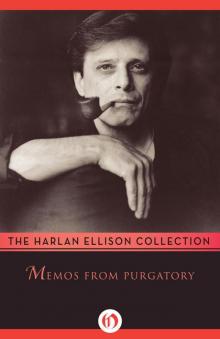 Memos From Purgatory
Memos From Purgatory I Have No Mouth and I Must Scream
I Have No Mouth and I Must Scream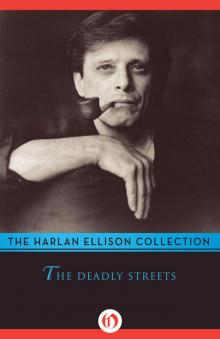 The Deadly Streets
The Deadly Streets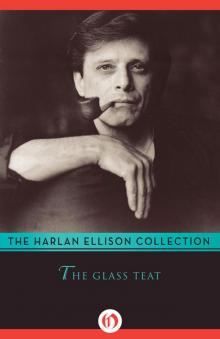 The Glass Teat
The Glass Teat Paingod and Other Delusions
Paingod and Other Delusions No Doors No Windows
No Doors No Windows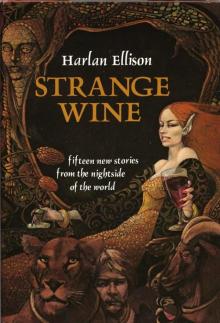 Strange Wine
Strange Wine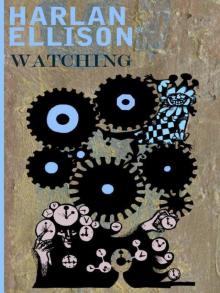 Harlan Ellison's Watching
Harlan Ellison's Watching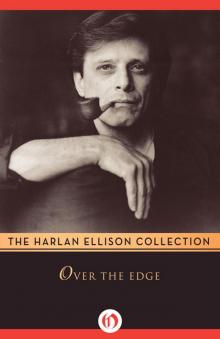 Over the Edge/An Edge in My Voice
Over the Edge/An Edge in My Voice Troublemakers: Stories by Harlan Ellison
Troublemakers: Stories by Harlan Ellison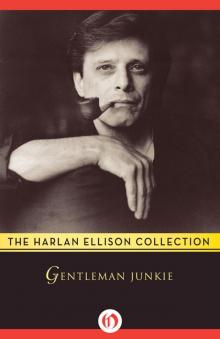 Gentleman Junkie and Other Stories of the Hung-Up Generation
Gentleman Junkie and Other Stories of the Hung-Up Generation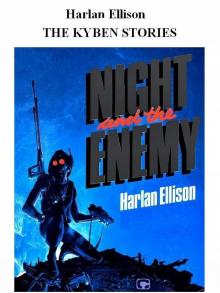 The Kyben Stories
The Kyben Stories From the Land of Fear
From the Land of Fear The Top of the Volcano: The Award-Winning Stories of Harlan Ellison
The Top of the Volcano: The Award-Winning Stories of Harlan Ellison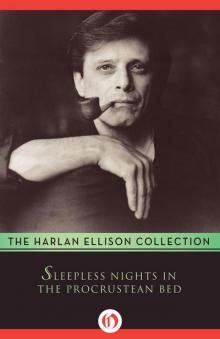 Sleepless Nights in the Procrustean Bed
Sleepless Nights in the Procrustean Bed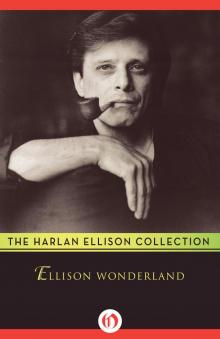 Ellison Wonderland
Ellison Wonderland Children of the Streets
Children of the Streets Can & Can'tankerous
Can & Can'tankerous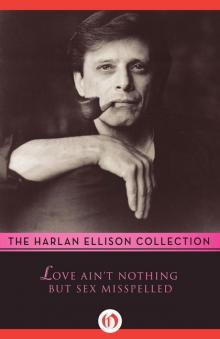 Love Ain't Nothing but Sex Misspelled
Love Ain't Nothing but Sex Misspelled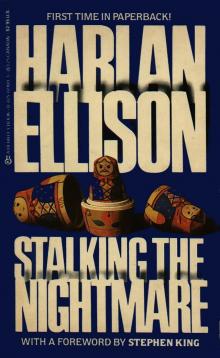 Stalking the Nightmare
Stalking the Nightmare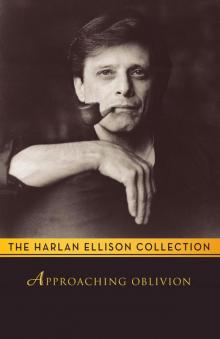 Approaching Oblivion
Approaching Oblivion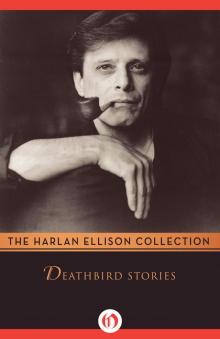 Deathbird Stories
Deathbird Stories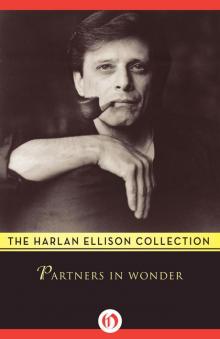 Partners in Wonder
Partners in Wonder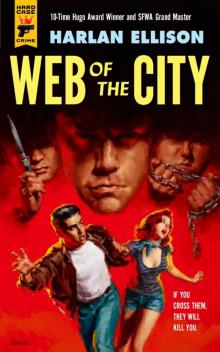 Web of the City
Web of the City Spider Kiss
Spider Kiss A Boy and His Dog
A Boy and His Dog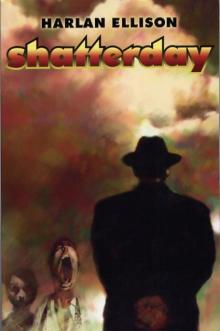 Shatterday
Shatterday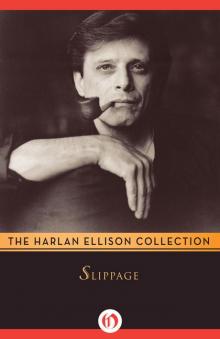 Slippage: Previously Uncollected, Precariously Poised Stories
Slippage: Previously Uncollected, Precariously Poised Stories Repent, Harlequin! Said the Ticktockman
Repent, Harlequin! Said the Ticktockman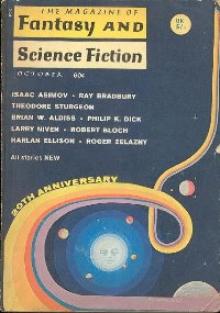 Come to Me Not in Winter's White
Come to Me Not in Winter's White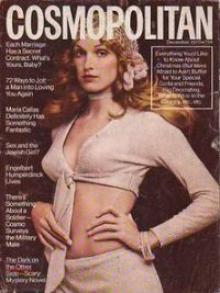 The Song the Zombie Sang
The Song the Zombie Sang The Other Glass Teat
The Other Glass Teat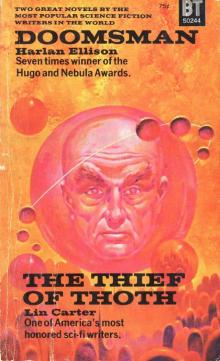 Doomsman - the Theif of Thoth
Doomsman - the Theif of Thoth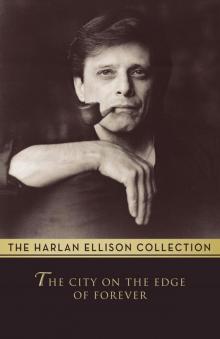 The City on the Edge of Forever
The City on the Edge of Forever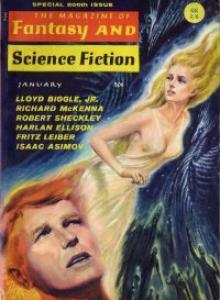 I See a Man Sitting on a Chair, and the Chair Is Biting His Leg
I See a Man Sitting on a Chair, and the Chair Is Biting His Leg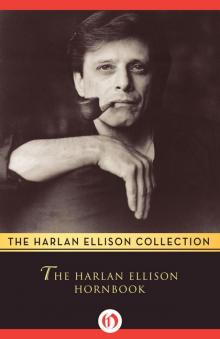 The Harlan Ellison Hornbook
The Harlan Ellison Hornbook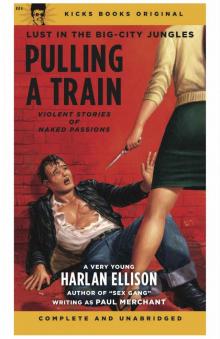 Pulling A Train
Pulling A Train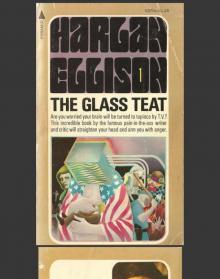 The Glass Teat - essays of opinion on the subject of television
The Glass Teat - essays of opinion on the subject of television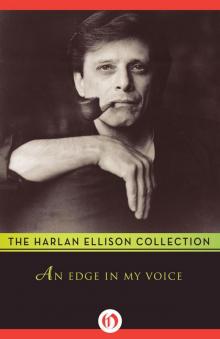 An Edge in My Voice
An Edge in My Voice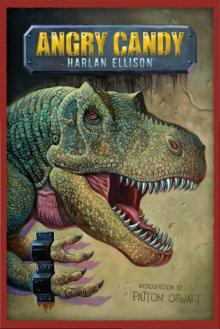 Angry Candy
Angry Candy Troublemakers
Troublemakers The Top of the Volcano
The Top of the Volcano Over the Edge
Over the Edge Survivor #1
Survivor #1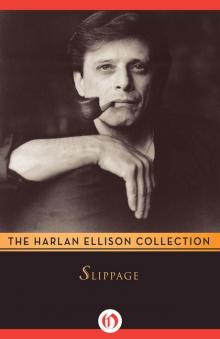 Slippage
Slippage